Today I am going to show you how to answer job interview questions such as “Why Mckinsey?”, “why BCG?” or “Why Bain?”.
In fact, “Why consulting firm X?” is one of the interview questions you must answer in ALL your job interviews.
Plus, this question must be answered in your cover letter too.
Yet, most candidates struggle with crafting a good answer to the “Why McKinsey?”, “Why BCG?” and “Why Bain?” questions.
For instance, most candidates have a generic answer: they use reasons that can be applied to any consulting firm.
So, this article will tell you what consulting firms expect from you with this question and how to craft a singular and persuasive answer.
Important: besides fit interviews, you must stand out during your case interviews. Don’t know what to do? Check out this free case interview course to learn how.
Let’s get started right now!
Table of Contents
Get the latest data about salaries in consulting
Understand Why Consulting Firms Ask This Question
Along with “Why consulting?” questions such as “Why McKinsey?”, “why BCG?” or “Why Bain?” is one of the motivational questions you will have during your fit interview (or Experience Interview or Personal Experience Interview at McKinsey).
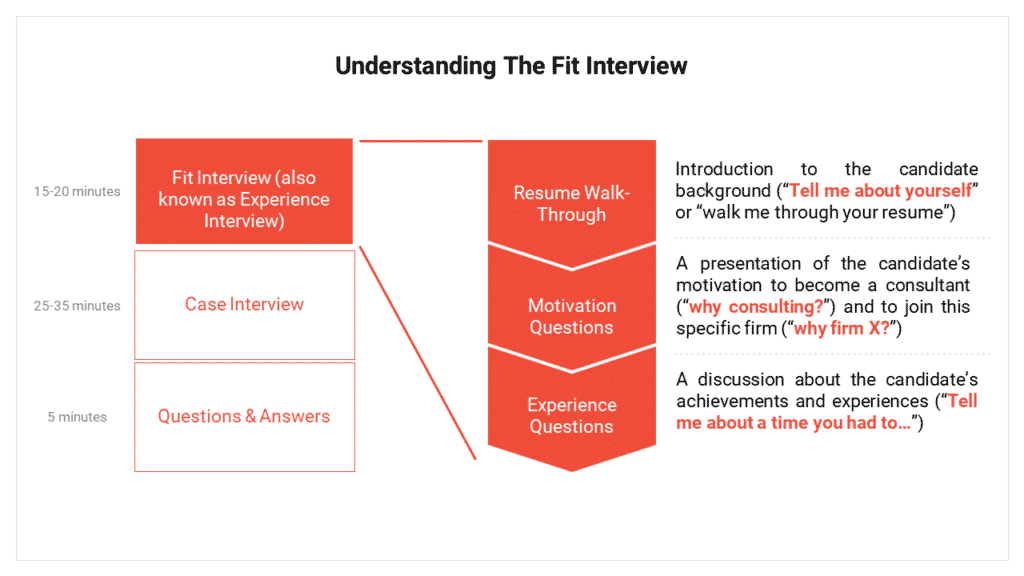
Related articles:
- Master the McKinsey Personal Experience Interview
- Want to know the secrets of McKinsey’s hiring process? Read this.
- And you’ll NOT secure an offer at McKinsey without wowing your interviews during case interviews. But do you know the specifics of the McKinsey case interview? If not, read our complete guide.
- Interested in landing an offer at BCG? Read our complete guide about the BCG’s hiring process.
- Or you’re attracted by Private Equity or Financial Services. Hence, Bain & Company can be a serious option. Discover the ins and outs of Bain & Company’s hiring process.
With this question, your interviewers test if you understand each firm’s specificities and if you are truly interested in working for them.
Why?
Because hiring and training a new Consultant is very expensive.
Indeed, they invest a lot of money and time in their consultants to hire and train new consultants.
Thus, they don’t want to see you leave the firm after 6 or 12 months because you do not fit the firm’s culture.
In other words, they are asking this question to assess the risks of hiring you.
In conclusion, this question is critical to get an offer from consulting firms such as McKinsey, BCG, or Bain & Company, and you can’t skip having a solid, persuasive answer.
Do NOT Answer These Questions Like This (It's A Mistake Made By Most Candidates)
Top Consulting Firms Have Lots Of Similarities
The top consulting firms such as McKinsey, the Boston Consulting Group, and Bain & Company have many similarities, for instance:
- Working with bright people. Top consulting firms are renowned for having a rigorous recruitment process and hiring top talents from the best universities. Thus, you will be surrounded by great colleagues, learn a lot from them, and make lifelong friends.
- Grow as a professional. The top firms are driven by a relentless focus on quality and strict adherence to their professional values and standards. As a result, you will often be pushed to your limits and develop strong communication, problem-solving, and analytical skills. Though it’s not always fun, getting through the challenging times and long hours will make you a well-seasoned professional.
- Working on challenging and impactful projects. If you join a top consulting firm, you will have the opportunity to work for top-notch clients across many industries. Working for these clients results not only in interesting work but also in exposure to senior executives
- Participate in ongoing mentorship and training. Top consulting firms greatly emphasize continuous learning and improvement of their Consultants. For instance, McKinsey’s training budget is about $200m annually. Also, Consulting is an industry where receiving regular feedback, both formal and informal, is very common, which is another excellent opportunity to learn.
The Mistake To Avoid At All Cost
Thus, a big mistake when crafting an answer to “why McKinsey?”, “why BCG?”, or “why Bain?” is to do nothing but picking up a couple of reasons above and say something like:
A bad sample answer to the “why McKinsey” question:
“I want to join McKinsey for 3 reasons.
First, because of the environment here at McKinsey. I know that I will be intellectually challenged and stimulated.
Secondly, I will have the opportunity to work with brilliant people. You are known for recruiting only the top talents, and I look forward to learning from them.
Thirdly, McKinsey works for top-notch clients. I look forward to working on their most pressing problems and having an impact.”
The sample answer above is weak because these arguments can be applied to any top consulting firm.
In other words, this answer fails to show that the candidate understands the specificities of the firm and that he (or she) is genuinely interested in working for McKinsey & Company.
Therefore, the interviewer can think that moving this candidate to the next round is too risky: maybe this candidate will not fit the firm’s culture and leave after six months.
Instead, Use This Framework To Craft A Singular And Persuasive Answer
Remember that your objective is to convince your interviewer that you are genuinely interested in joining this firm and that your decision to apply for a position in their firm is thoughtful.
To do so, you must give your interviewers relevant and specific reasons to join this firm and compelling evidence that these reasons are meaningful for you.
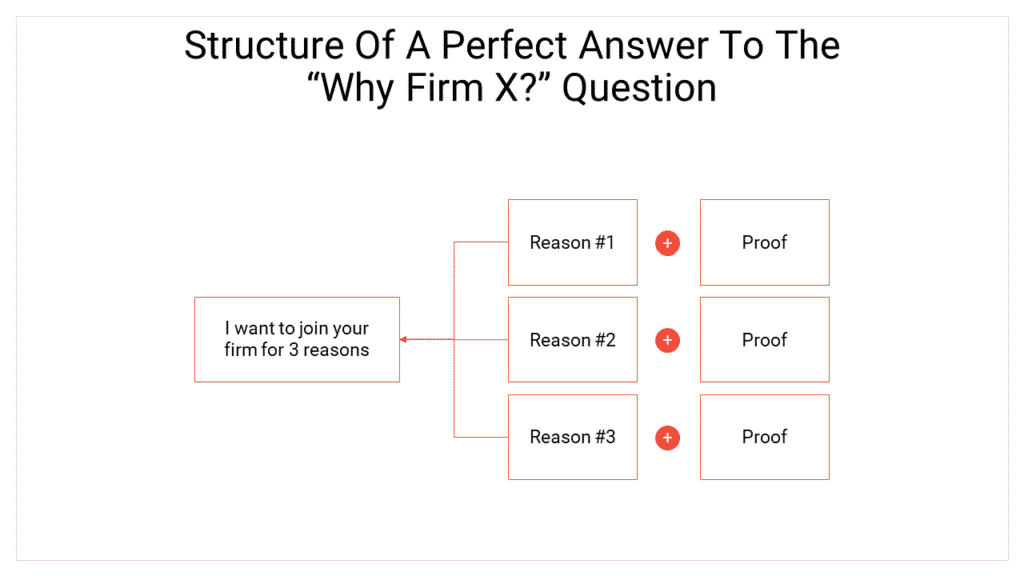
Give Your Interviewers Relevant And Specific Reasons To Join This Particular Firm
There are two ways to give your interviewers specific and relevant reasons why you want to join a particular firm:
First, the WHAT.
At a macro level, all consulting firms are doing the same things: solving their client’s most pressing problems.
But at a “micro” – that means for a particular office such as London, Paris, or Dubai – level, the types of projects or industries they focus on are specific.
Thus, you must understand what types of projects the office you want to join works on.
For instance, Bain London focuses on the Financial Services industry, and McKinsey Casablanca does a lot of projects in the Public Sector.
Secondly, the HOW.
This is how they are doing things. In other words, you must understand how a consulting firm promotes its way of working.
For instance, Bain & Company highlights its culture of teamwork and its motto, “A Bainie never lets another Bainie fail.”
This doesn’t mean that the other consulting firms do not have a teamwork culture.
However, this means that Bain has decided to highlight “teamwork” when communicating what makes them unique.
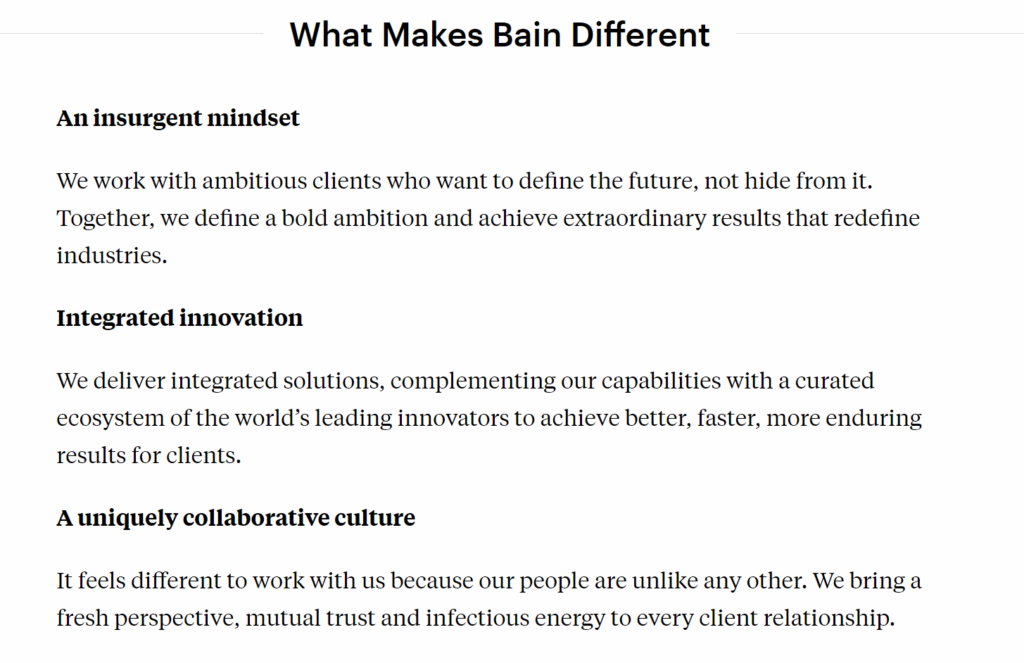
Another example: the Boston Consulting Group promotes individuality and diversity.
Each office has its own culture (unlike McKinsey and its one-firm culture) and the diversity of the profiles of their Consultants is richer than any other consulting firm.
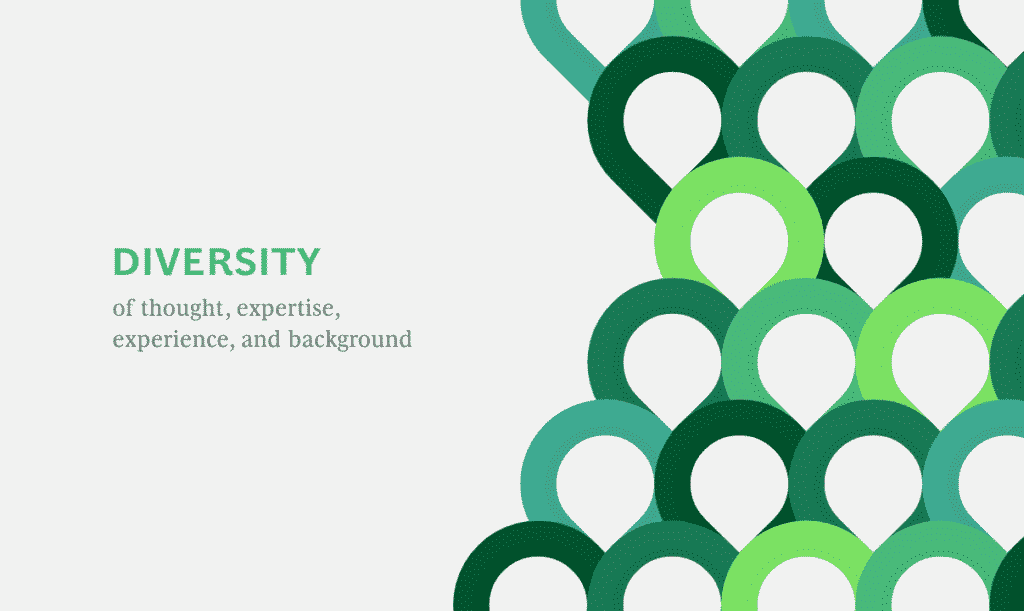
A last example: McKinsey has a strong feedback culture.
In other words, McKinsey has set up a culture of coaching and mentoring, as well as invested a lot of money in training its Consultants.
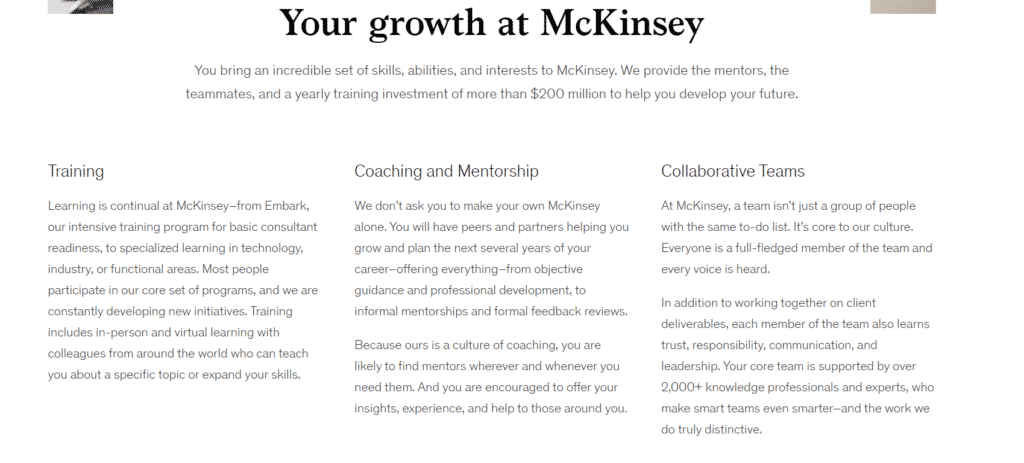
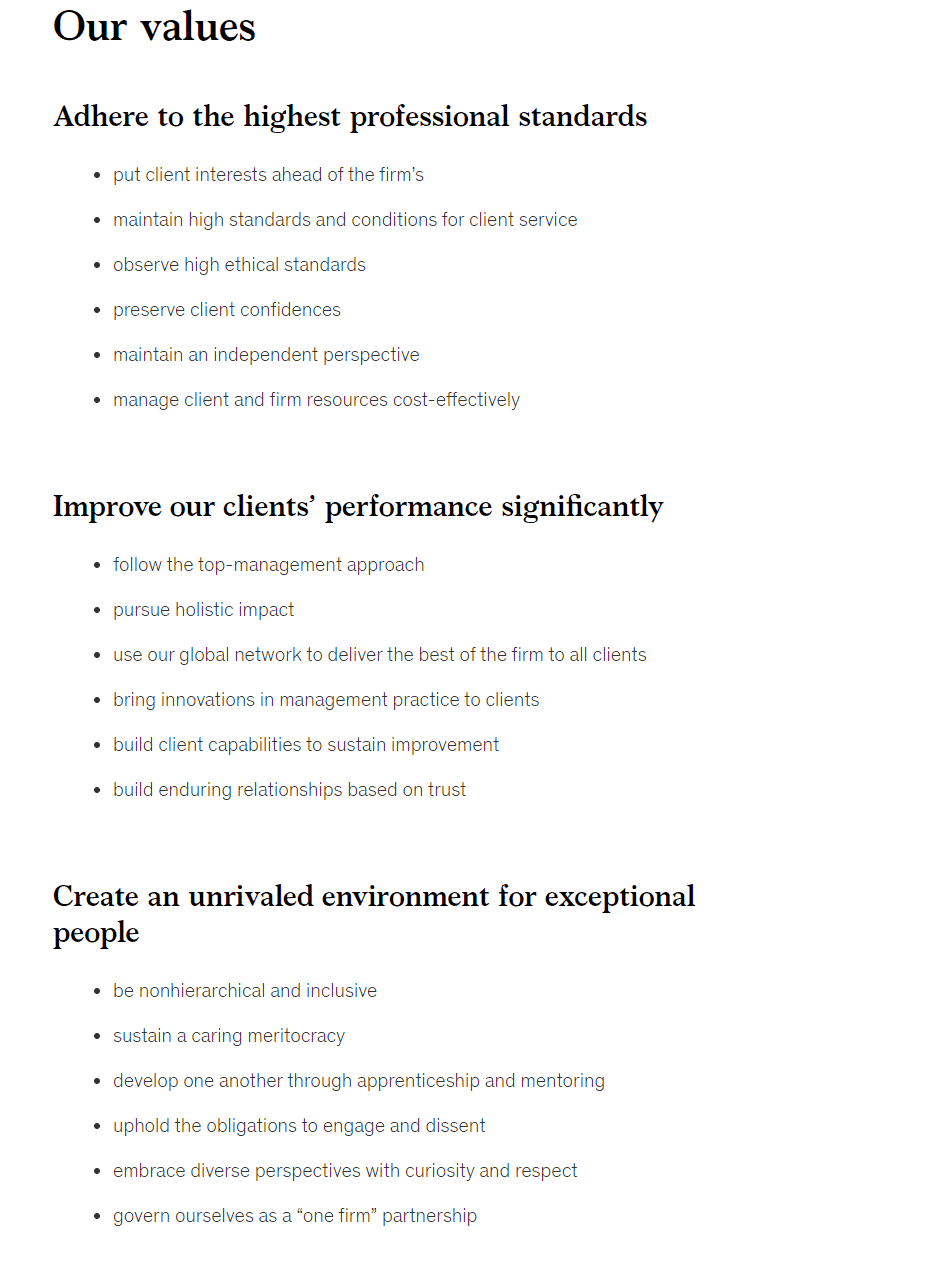
Therefore, this is your job to grasp how the consulting firm you want to join communicates about its way of working.
Get 4 Complete Case Interview Courses For Free

You need 4 skills to be successful in all case interviews: Case Structuring, Case Leadership, Case Analytics, and Communication. Join this free training and learn how to ace ANY case questions.
Use Compelling Pieces Of Evidence To Support Why You Want To Join This Particular Firm
You must give your interviewers compelling proof that what you say is not a list of random, copied-and-pasted arguments.
Instead, you can use these 4 compelling proofs to show your interviewers that you have seriously thought about why you want to work for them:
First, you talked to at least one Consultant from the firm (even better if these Consultants work in the particular office you are applying to).
There is no better proof than this one.
It shows your motivation, but you also probably understand what they are doing and how they are doing things.
Thus, networking is key: talk to as many Consultants as possible! (you can check this article to help you network with Consultants.
For instance, you have hereafter an interview with Juliana, an ex Bainie who managed to get a job offer from McKinsey and Bain (along with 5 other offers!!).
In this interview, she explains why she chose Bain… and much more!
Another example: hereafter is an interview with Clément, an ex Project Leader at the Boston Consulting Group.
In this interview, you will have many insights about the BCG’s specificities.
Secondly, you have worked with a Consultant from the firm.
Maybe during an internship or during your previous job, you had the chance to work with a team of Consultants from the firm you have an interview with.
If this is the case, say it.
Actually, this shows that you understand how they work.
Thirdly, you have read reports they have written or did research on their websites.
This is proof that you understand what they are doing.
Plus, this shows you did some homework and your motivation to join this particular firm.
For instance, you can check their website to find where they mention “what makes them unique” or “what makes them different.”
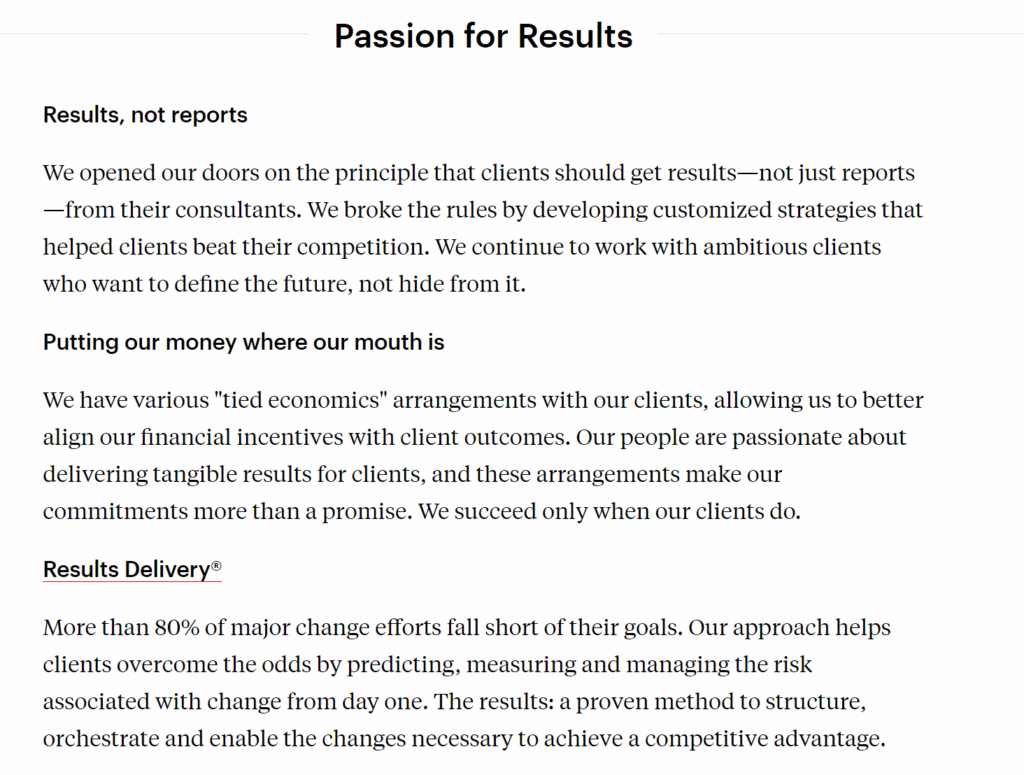
Fourthly, you can connect your reasons for joining this firm with your past experiences.
For instance, you are attracted by Bain & Company’s teamwork culture because you used to work in a company with a strong teamwork culture, and you loved that.
Simple.
No?
Then, let’s see in the next section how this framework works to answer the question, “Why McKinsey & Company?”.
Why McKinsey? Get Inspired By This Sample Answer
Here is a sample answer to the “why McKinsey?” question:
Good example:
“After my conversations with [Consultant Name] and [Consultant Name] from the Casablanca office, I am convinced that McKinsey is the company I want to work for.
First, because I was extremely impressed with McKinsey’s culture of excellence. [Consultant Name] told me how each Consultant at McKinsey adheres to McKinsey’s values such as to meet the highest professional standards to deliver a strong impact to its clients. This is exactly how I envision the next step of my career: deliver real, tangible value to my clients.
Secondly, because of McKinsey’s one-firm culture. I understand that McKinsey put together the best team to solve its clients’ problems. Hence, I will have the opportunity to work with top-notch experts from all over the world and learn a lot from them. I find it very stimulating to work in such an international environment.
Thirdly, because of the leadership of the McKinsey Casablanca office in the Public sector. Thus, I will have the opportunity to work on projects that will deeply impact the North Africa region. Given my personal bond with Africa, I want to play a key role in shaping African public organizations for the next decade.”
To conclude, if you want to learn more about the McKinsey hiring process, check this article.
Why BCG? Get Inspired By This Sample Answer
Here is a sample answer to the “why BCG?” question:
Good example:
“Over the last couple of months, I talked to 5 Consultants from the BCG New York office.
From these conversations, I understand that you are doing a lot of projects in the Financial Services industry. This is one of the main reasons why I am so much interested in working here. Not only, did I love my 6-month internship at Bank of America, but also, I find the issues at stake in this sector – such as the rise of fintech companies – fascinating. I am really excited to join your teams and work on such projects.
Besides, during the event organized by your firm at [your school name], I met [Consultant Name] and [Consultant Name]. We talked a lot about the Boston Consulting Group culture, and they both mentioned how the Boston Consulting Group is an incredibly diverse place. For instance, they worked with people from so many different backgrounds such as Medical Doctors, or with people with a Ph.D. in astrophysics or medieval literature. This diversity is one of the reasons why I decided to join my [school name], and I look forward to continuing to work in a similar environment.”
To conclude, if you want to learn more about the Boston Consulting Group hiring process, check this article.
Why Bain? Get Inspired By This Sample Answer
Here is a sample answer to the “why Bain?” question:
Good example:
“First, when I worked at [Company Name], I worked with Bain’s Consultants to design the new [Company Name]’s strategy in the HNWI segment. [Company Name] was losing its leadership position in this market, and a new strategy was immensely needed!
I appreciated the teamwork culture that Bain’s Consultants showed along this project. I literally felt part of their team. For instance, the Project Manager and I presented together the new Marketing strategy to [Company Name]’s Board of Directors. This is the kind of environment I want to work in, and the kind of relationship I want to develop with my clients.
Secondly, I recently discussed with [Consultant Name], and she mentioned the entrepreneurial culture at Bain Paris office, and how innovative ideas are valued. This is why I decided to do a 6-month internship at [Startup Name], whose mission was to disrupt the Real Estate sector. During this internship, I loved finding strategies about how to serve customer needs in a new and better way than the existing players.
Lastly, I have a strong interest in Private Equity. The leading position of the Bain Paris office in the Private Equity sector and the fact that Bain was selected by Ardian to work on the [confidential] deal played a significant role in my decision to apply. This shows that while at Bain I could get the opportunity to work on truly unique projects in the Private Equity sector.“
To conclude, if you want to learn more about the Bain & Company hiring process, check this article.
Show Your Motivation With Your Voice And Body Language As Well
You can have a well-articulated answer saying why you want to pursue a career in Consulting.
Still, if your voice and body language says something different, your interviewer will likely not be convinced.
Actually, many studies show that, in communication, body language and voice are more important than the words you are saying!
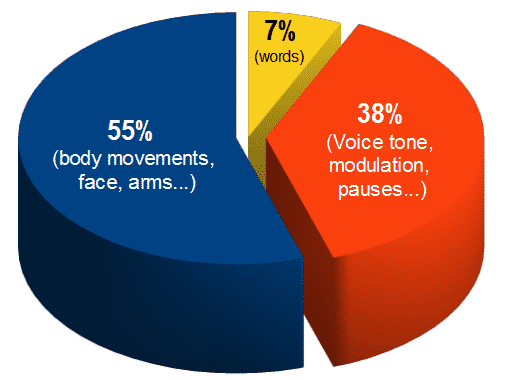
So, how do you show your motivation with your body language and voice?
First, you must know your answer by heart.
So that during the interviews, you will not have to think about the content but only your body language and voice.
To do so, I recommend you repeat 5 or 6 times your answer out loud before your actual interviews.
Next, use the following 3 tips to alter your body language and give off a more confident impression:
- Maintain an assertive posture
- Watch your hands. Especially stop fidgeting.
- Maintain appropriate eye contact
Now It's Your Turn
Important: besides fit interviews, you must stand out during your case interviews. Don’t know what to do? Check out this free case interview course to learn how.
Then you have it:
How to answer questions such as “Why McKinsey?”, “why the Boston Consulting Group?” or “Why Bain & Company?”.
So, what are the main reasons you decided to join McKinsey?
Or the Boston Consulting Group?
Or Bain & Company?
Or, maybe you are still struggling to craft a compelling answer?
Thus, what is your major challenge when responding to one of these questions?
Just leave a comment below with your thoughts!
Sébastien
Get 4 Complete Case Interview Courses For Free

You need 4 skills to be successful in all case interviews: Case Structuring, Case Leadership, Case Analytics, and Communication. Join this free training and learn how to ace ANY case questions.
SHARE THIS POST

Pingback: All About Bain Recruitment Process - Career in Consulting
This is very helpful! Thanks!
Thank you!
This is a wonderful news regarding bloggers. It opens admission to a huge spectrum of individuals who are finding an establishment to express their inquiries. With your theme, I could gain the visibility We are having at this moment. Thanks just for this informative publish, I learned a whole lot!